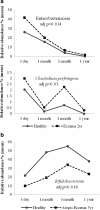Molecular analysis of infant fecal microbiota in an Asian at-risk cohort-correlates with infant and childhood eczema
- PMID: 24650346
- PMCID: PMC3994565
- DOI: 10.1186/1756-0500-7-166
Molecular analysis of infant fecal microbiota in an Asian at-risk cohort-correlates with infant and childhood eczema
Abstract
Background: Studies have suggested that selective microbial targets prevail in the fecal microbiota of infants with eczema. This study evaluated the composition of fecal microbiota of infants who developed eczema in the first 5 years of life and compared these with those of healthy controls.
Findings: Children who developed eczema in the first 2 years, those with eczema at 5 years of age and healthy controls were selected from the placebo arm of a birth cohort of at-risk infants participating in a randomized double-blind trial on the protective effects of supplemental probiotics in early life on allergic outcomes. Molecular evaluation of fecal microbiota were conducted using Fluorescence In Situ Hybridization-Flow Cytometry (FISH-FC) for fecal samples collected. Longitudinal analysis of fecal microbiota composition at three days, one and three months and one year of life revealed higher abundance of Enterobacteriaceae [coefficient (B): 1.081, 95% CI: 0.229-1.933, adj p = 0.014] and Clostridium perfringens [coefficient (B): 0.521, 95% CI: 0.556-0.988, adj p = 0.03] in those who developed eczema in the first 2 years life. In those with eczema at 5 years of age, a lower abundance of Bifidobacterium was observed [coefficient (B): -27.635, 95% CI: -50.040 - -5.231, adj p = 0.018].
Conclusions: The differences in infant fecal microbiota observed in eczema subjects in this study support the notion that relative abundance of selective microbial targets may contribute to the subsequent development of eczema in childhood.
Figures


Similar articles
-
Comparative analysis of fecal microbiota in infants with and without eczema.PLoS One. 2010 Apr 1;5(4):e9964. doi: 10.1371/journal.pone.0009964. PLoS One. 2010. PMID: 20376357 Free PMC article.
-
Early-life gut microbiota associates with allergic rhinitis during 13-year follow-up in a Finnish probiotic intervention cohort.Microbiol Spectr. 2024 Jun 4;12(6):e0413523. doi: 10.1128/spectrum.04135-23. Epub 2024 Apr 30. Microbiol Spectr. 2024. PMID: 38687061 Free PMC article.
-
Having older siblings is associated with gut microbiota development during early childhood.BMC Microbiol. 2015 Aug 1;15:154. doi: 10.1186/s12866-015-0477-6. BMC Microbiol. 2015. PMID: 26231752 Free PMC article.
-
Association between the intestinal microbiota and allergic sensitization, eczema, and asthma: A systematic review.J Allergy Clin Immunol. 2019 Feb;143(2):467-485. doi: 10.1016/j.jaci.2018.09.025. Epub 2018 Dec 29. J Allergy Clin Immunol. 2019. PMID: 30600099
-
How do Microbiota Influence the Development and Natural History of Eczema and Food Allergy?Pediatr Infect Dis J. 2016 Nov;35(11):1258-1261. doi: 10.1097/INF.0000000000001314. Pediatr Infect Dis J. 2016. PMID: 27518828 Review. No abstract available.
Cited by
-
Ratio of Klebsiella/Bifidobacterium in early life correlates with later development of paediatric allergy.Benef Microbes. 2017 Oct 13;8(5):681-695. doi: 10.3920/BM2017.0020. Epub 2017 Oct 12. Benef Microbes. 2017. PMID: 29022383 Free PMC article.
-
Winds of change a tale of: asthma and microbiome.Front Microbiol. 2023 Dec 11;14:1295215. doi: 10.3389/fmicb.2023.1295215. eCollection 2023. Front Microbiol. 2023. PMID: 38146448 Free PMC article. Review.
-
Altered Gut Microbiota Composition Associated with Eczema in Infants.PLoS One. 2016 Nov 3;11(11):e0166026. doi: 10.1371/journal.pone.0166026. eCollection 2016. PLoS One. 2016. PMID: 27812181 Free PMC article.
-
Gut microbiota and atopic dermatitis: a two-sample Mendelian randomization study.Front Med (Lausanne). 2023 Jun 22;10:1174331. doi: 10.3389/fmed.2023.1174331. eCollection 2023. Front Med (Lausanne). 2023. PMID: 37425302 Free PMC article.
-
Immune-modulatory genomic properties differentiate gut microbiota of infants with and without eczema.PLoS One. 2017 Oct 19;12(10):e0184955. doi: 10.1371/journal.pone.0184955. eCollection 2017. PLoS One. 2017. PMID: 29049378 Free PMC article.
References
-
- Soh SE, Aw M, Gerez I, Chong YS, Rauff M, Ng YP, Wong HB, Pai N, Lee BW, Shek LP. Probiotic supplementation in the first 6 months of life in at risk Asian infants–effects on eczema and atopic sensitization at the age of 1 year. Clin Exp Allergy. 2009;39(4):571–578. doi: 10.1111/j.1365-2222.2008.03133.x. - DOI - PubMed
Publication types
MeSH terms
Substances
LinkOut - more resources
Full Text Sources
Other Literature Sources
Medical

